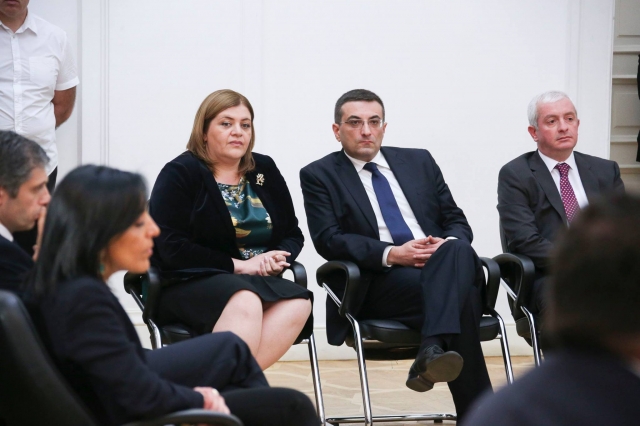Georgia’s Constitutional Court Swears in Three New Judges
BATUMI, Georgia - Three judges have been appointed to Georgia’s Constitutional Court after taking the oath of office in Batumi on Monday.
Irina Imerlishvili, Giorgi Kverenchkhiladze and Teimuraz Tugushi were appointed to the Court after the 10-year terms of four judges expired on September 30.
Imerlishvili and Kverenckhiladze were appointed as Court judges on September 10 Georgian President Giorgi Margvelashvili, while Tugushi was elected by the Supreme Court on September 20.
A fourth judge will be elected by the Parliament following Saturday's parliamentary election.
Georgia’s Constitutional Court consists of nine members, but as the ninth member has to be elected by the Parliament, only eight judges will participate in the elections of the Court Chair.
The Court is currently chaired on an interim basis by Zaza Tavadze after former Court President Giorgi Papuashvili's term expired on September 30.
Tavadze will remain in the position pending the election of a new Court President.
A new chairman is expected to be elected by the end of the of the month, and the judges will choose two vice chairs and a secretary of the Constitutional Court following parliamentary elections on October 8.
Commenting on the new appointments, Margvelashvili said the three judges have a critical role to play in building Georgia’s democratic institutions.
Papuashvili also delivered a speech at the ceremony, wherein he underlined the court’s important role in the country.
Earlier this summer, Papuashvili publicly stated that certain Court judges were being watched and blackmailed by elements within the ruling Georgian Dream party to rule in favor of the current government in a number of outstanding cases.
Papuashvili did not specify the names involved in the cases but noted that most were well known.
Papuashvili’s claims were followed up by an investigation under the jurisdiction of the Prosecutor General’s Office, but it remains pending as law enforcement officials insist the case lacks evidence.
By Thea Morrison
Edited by Nicholas Waller












